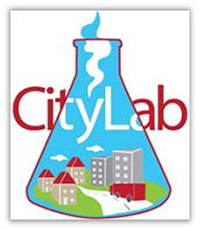United States - European Commission Urban Freight Twinning Initiative: Compendium of Project Summaries, Volume II
Overview of 2018-2019 International Urban Freight Roundtables
| Research | Policy | Pilot | European Union |
CITYLAB
Goods, waste, and service trips in urban areas impose negative traffic and environmental impacts; there is a need for cost-effective and sustainable solutions. The CITYLAB objective is to develop knowledge and solutions that result in up-scaling and roll-out of strategies, measures, and tools for emission-free city logistics in urban centers by 2030. Using a living lab approach in seven different European cities, the project focuses on four types of intervention:
- Highly fragmented last-mile deliveries in city centers.
- Large freight attractors and public administrations.
- Urban waste, return trips and recycling.
- Logistics facilities and warehouses.
A common goal is the reduction of pollutant emissions from freight transportation in urban centers. The project has a budget of about $4.8 million (€4 million).

The CITYLAB logo.
Source: TØI.
Project Types
Research, Policy, Pilot.
Period of Performance
May 2015 - April 2018.
Project Sites
Amsterdam, Netherlands; Brussels, Belgium; London, United Kingdom; Oslo, Norway; Paris, France; Rome, Italy; and Southampton, United Kingdom.
Contact
Jardar Andersen
Chief Research Engineer, Logistics and Innovation
Transportøkonomisk institutt - TØI
Oslo, Norway
JAn@toi.no
+47 997 00 804
Topics Addressed
- Air quality/environment.
- Building/road design.
- Land use interaction.
- Last mile delivery.
- Logistics/distribution.
- Mobility/congestion.
Expected Outcomes
The website (www.citylab-project.eu) provides useful outputs describing each living lab's outcomes and observations, including:
- An animated video giving an overview of the living lab approach, accompanied by a briefing note giving more details in each city.
- Cartoons telling the story of each urban freight implementation.
- Project deliverables (reports), published articles, presentations, and workshop reports.
- A summary 16-page version of “Observatory of strategic developments impacting urban logistics” covering: logistics land uses and urban sprawl; e-commerce and 'instant' deliveries, and service trips.
- 6 monthly newsletters, providing summary information of all our activities.
- Key statistics from cities, referred to as 'Dashboards'.
- Links to external projects.
- The website will continue to be updated with key outputs including detailed evaluation results for all of the implementations from each city.
Stakeholder Involvement
Public agencies (mainly transport-related), private freight actors, research community, citizens, and goods receivers (e.g. retailers, hospitals). The project is actively disseminating tailored information to 18 'follower' European cities and regions with 9 'transfer' cities selected for active involvement, including training, technical visits, interactive workshops, and transferability analyses.